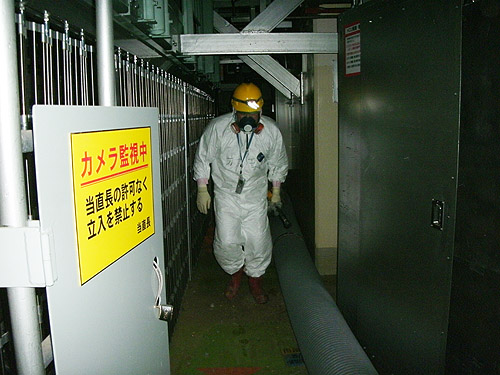|
 |
|
EANING UP: An engineer works inside the crippled Fukushima Daiichi Nuclear Power Plant on May 9 (XINHUA) |
Finally, the expansion of nuclear power in emerging markets is predominantly state-led: Governments are directly planning and implementing civilian nuclear energy programs, supporting their state-owned nuclear companies including their emergence as international vendors, and partnering with international companies, many also state-owned. Rosatom in Russia, China's National Nuclear Power Corp. and the Nuclear Power Corp. of India Ltd. are examples of these. State backing can lower transaction and capital costs, and government commitment—if not outright mandate—facilitates and streamlines project implementation. For example, recent estimates indicate it costs twice as much to build a nuclear plant in the United States and Europe as in China. The French EPR reactor, for example, costs 2.5 times more than South Korea's APR1400. With such an increasingly active and prominent role for governments, political considerations and not purely commercial factors will play a major role in the future of nuclear power.
Emerging market countries will face some increased challenges to a continued policy of civil nuclear expansion in the wake of Fukushima. Whether expanding existing nuclear capacity or building reactors for the first time, countries will be under closer international scrutiny to ensure that infrastructure, financial resources, human capacity, and legal and regulatory frameworks are in place. These considerations apply equally to plant safety and to proliferation prevention.
They will also face louder public opposition to nuclear power. As the events of the "Arab Spring" populist uprisings in the Middle East and North Africa demonstrate, even countries that have hitherto been used to centralized decision-making ignore public opinion at their peril. Nongovernmental groups in India, Turkey, Jordan, Indonesia, and other countries have already started to question their governments' nuclear plans.
Although the end result of these issues and trends is difficult to know, we believe nuclear capacity in emerging markets will expand at a slower rate in the short term as they conduct safety reviews of existing plants, reexamine plans, or delay licensing, siting and other decisions. Many have also re-affirmed their longer-term commitment to nuclear power, including South Korea, Turkey, Indonesia, Brazil, India, Russia, China and Viet Nam.
Alternatives
Fukushima will have a dramatic effect on efforts to reduce global carbon dioxide emissions. The European financial services company Société Générale recently estimated if developed nations do not build any more nuclear power facilities, and existing plants are retired as scheduled, an additional 860 million tons of carbon dioxide will be emitted per year between 2010 and 2030. This would constitute a 6-percent increase over projected emissions during a period when industrialized countries' emissions are supposed to be stabilizing.
If the nuclear accident at Fukushima prompts the shutdown of existing plants or a deferral or scaling back in building new ones, other sources will have to fill the gap, namely natural gas, coal, renewables and efficiency.
Fukushima has occurred in the midst of a major global trend to increase the use of natural gas in power generation. Moreover, growing supplies of unconventional shale gas, led by a vast resource base in North America, are keeping gas prices low and are likely to do so for years to come. In short, Fukushima will bolster the move toward gas in power generation, and booming supplies will continue to put downward pressure on gas prices, detracting from the competitiveness of nuclear energy.
Many countries, such as China, India, Indonesia, South Africa, Pakistan, Poland and Germany, may have to turn to domestic coal resources in the short term if development of nuclear power slows. Clean coal options are a possibility but cost and timely commercial deployment are major obstacles. More efficient coal combustion processes, such as ultra-super critical pulverized coal and integrated gasification combined cycle, along with carbon capture and storage (CCS), could dramatically reduce carbon dioxide emissions from coal plants. But none of these technological approaches are much beyond the pilot or demonstration stage. Most analysts estimate CCS cannot be widely scaled up until after 2020.
Renewable sources of electricity generation, primarily wind and solar, are viable options, and indeed many countries are promoting them. In the United States, wind has accounted for more than 35 percent of total capacity added in the past four years, while China, India and many countries in Europe have aggressive targets for renewable capacity additions. But renewables face challenges in cost, intermittency and transmission. These are not insurmountable obstacles, but ones that do need to be addressed.
Energy efficiency is also a feasible alternative. For example, energy efficiency programs in the U.S. electricity sector saved 92.6 billion kilowatt-hours in 2009, enough to power 8 million homes and avoiding 66 million tons of carbon dioxide emissions. Efficiency is also cheap at an average cost of 3.8 U.S. cents per kilowatt-hour to implement.
In summary, we expect the Fukushima accident will drive greater deployment of natural gas and renewable energy capacity, especially wind. Also, a far more concerted effort is required to promote energy efficiency and commercialize clean coal technologies. Governments need to provide greater support for zero- and low-carbon alternatives with both market "pull" policies such as mechanisms to put a price on carbon, as well as market "push" policies, especially greatly expanded support for research and development for CCS for both coal and natural gas generation, grid-level storage, solar energy as well as efficient, next-generation vehicle battery chemistries.
Charles K. Ebinger is director of the Energy Security Initiative at the Washington, D.C.-based Brookings Institution. John P. Banks is a nonresident fellow with the Energy Security Initiative and adjunct professor with the School of Advanced International Studies at Johns Hopkins University
(Viewpoints in this article do not necessarily represent those of Beijing Review)
|
